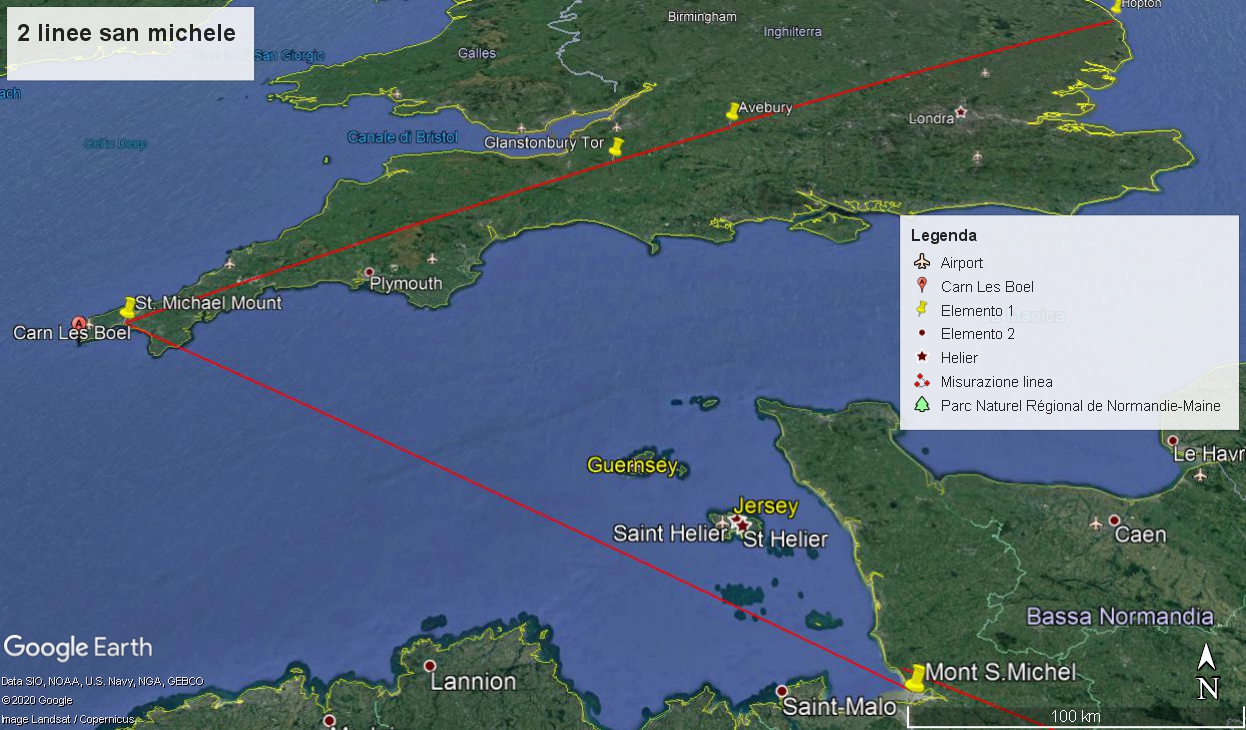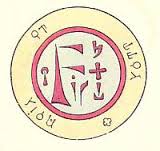Michael’s Line in England: from Cornwall to Norfolk the alignment of sacred sites through the religious history looked at from the perspective between the energies of Heaven and Earth, in continuity with the northwest-southeast line from Ireland to Israel.
Let’s now see an interesting intersection of this line with another one, equally famous, but a little more local: St. Michael’s Line in England.

There are analogies between the two lines and also differences, as we shall see. The most obvious is the orientation, as the alignment of the sites sacred to Michael in England runs from southwest to northeast.
With a certain approximation, several nodes can be traced according to radioaesthetic detection, over a length of about 570 km, if we take as extremes St. Michael’s Mount, in Cornwall, at the intersection of the two lines, and Hopton, a village locatedin the extreme east of England, in Norfolk, lying on the North Sea.

By Unknown author – This image is available from the United States Library of Congress’s Prints and Photographs division under the digital ID ppmsc.08234.
“Photographs in this collection were published before 1929 and are therefore in the public domain.” from the Wikimedia Commons
However, this distance, compared to the Skelling-Armageddon line, is much smaller, and consequently the Earth’s curvature has a smaller impact on the measurement. Therefore, if you look for a telluric line, a so-called “ley”, you can easily find many points of radioesthetic interest and then identify some even more precise points coinciding with the celestial alignment. The St. Michael’s Mount -Hopton line is oriented exactly 60 ° azimuth from the north at the sunrise position on May 1st (Beltane festival).
On this line we find 10 sacred sites to which the so-called telluric St. Michael’s line (“ley”) is associated, with an approximation not exceeding 5 ° compared to the 60 ° of astronomical reference:
| Site | Region | Period of foundation |
| Burrow Mump, Saint Michael’s Church | Somerset | XV century |
| Saint Michael’s Church, Othery | Somerset | XII century |
| Saint Michael’s Church, Tor, Glanstonbury | Somerset | XI-XII century |
| Stoke Saint Michael Church | Somerset | XII century |
| Avebury | Wiltshire | Neolithic period (4000-2500 b.C.) |
| Ogbourne Saint George | Wiltshire | XI-XII century |
| Saint Michael’s Church, Clifton Hampden | Oxfordshire | XI-XII century |
| Royston Cave | Hertfordshire | XI-XII century |
| Bury Saint Edmunds | Suffolk | Bronze Age (2100-750 b.C.) |
| Saint Margaret’s Church, Hompton | Norfolk | XIV-XV century |


As a matter of fact, tradition attributes to this alignment at least 15 sites, some of which are of certain religious and cultural importance, but with a greater approximation than the azimuth direction of 60 ° from the north (for example Carn Le Boel is located at 89 °) but this does not invalidate our reasoning: we know that the Earth’s energy channel (called The Serpent by Paul Broadhurst and Hamish Miller) moves with its coils and can be “traced” through terrestrial acupuncture techniques (megaliths in the Neolithic, tower and churches in the Middle Ages) to an almost straight line, in alignment with certain solar positions, at certain times, thus creating space-time bridges between Heaven and Earth.

As we have already seen for the Skelling-Armageddon line, that leads us to establish a connection between the telluric world and the celestial one, also for the St. Michael’s Mount -Hompton line there is an important synchronicity with the solar cycle. In fact, the two lines have an angular azimuth difference of 60° and if we verify the azimuth position of the sunrise on May 1st, this is 63 ° 53 ′ in 2020, that is today, but 4000 years ago, taking into account the precession of the equinoxes, the Sun was exactly at 61 ° 35 ‘from the north, aligned with the first point (St. Michael’s Mount) and with 4 other points whose azimuth is almost coinciding.
| site | Lat. N | Azimuth | |
| Burrowbridge Mump | 51° 4′ 6.24″ | 2° 55′ 13.76″ W | 61° 15′ 32.04” N° |
| Saint Michael’s Church, Othery | 51° 4′ 50.16″ | 2° 52′ 58.8″ W | 61° 15′ 32.04” N |
| Glanstonbury | 51° 8′ 54.6″ | 2° 42′ 50.4″ W | 61° 15′ 32.04” N |
| Stoke Saint Michael Church | 51° 13′ 15.6″ | 2° 28′ 54.84″ W | 61° 15′ 32.04” N |
We may notice that, even in the case of this alignment, we can make the same type of historical-religious analysis, namely by interpreting the sacred sites as a prodigious testimony of syncretism, which has led Christianity to enclose within itself the contents expressed by the proto-Christian beliefs, myths and religions of southern England. However, we should also identify some different and perhaps even more intriguing aspects: in fact, if between Skelling and Armageddon we were able to find the roots of Michael’s cult in the Greek-Roman and Celtic pantheon, here in England we could easily move the solar time clock even further back, up to the Neolithic civilization, spotting the megalithic sites right on St. Michael’s Line.
This time gap between the most ancient religions and Christianity, which in any case integrates them into its pattern, is marked by the solar cycle set at the date of Beltane, fundamental in the Celtic calendar, but also in the Christian one (remember that the Mary’s month begins on May 1st). The azimuth angle doubles if we pass the Christmas time marked by the winter solstice: in fact from the orientation at 60 ° NE we pass to 120 ° SE on the Michael’s cross (azimuth angles by convention referring to the local horizon starting from north). The two sunrises, on May 1st and on December 23rd represent two fundamental synchronicities of the Earth-Sun cycle in which the Divine is incarnated in a different shape and direction, but always constant in its higher celestial dimension.
In fact, the seasonal solar cycle always returns to itself, but never exactly to the same place, due to the precession of the equinoxes. It is therefore a circular spiral movement that allows us to have a perspective of cosmic evolution also in relation to the human one.
We can “evaluate” the significance of the azimuth shift from May 1st to December 23rd, that is the angle between the two Michael’s directions that form his sword, as the signal of change and transformation triggered by the Southeast Light, the most powerful of all the eight directions of the Compass, as well as Michael is the most powerful of all the eight Archangels.






